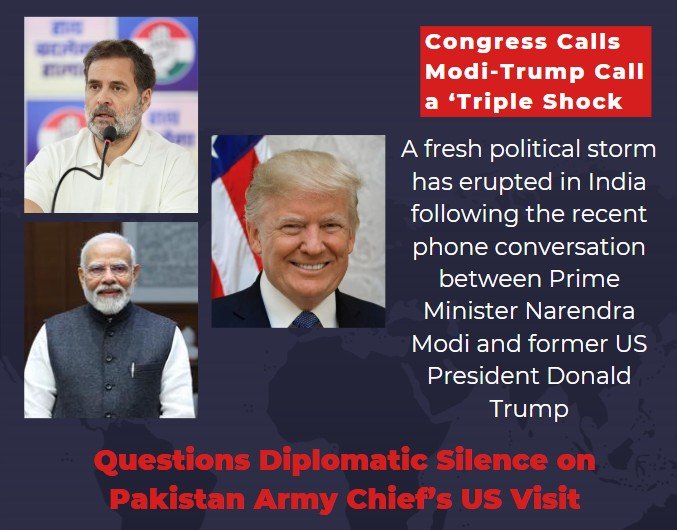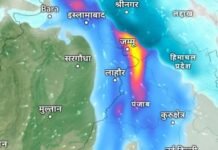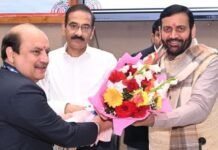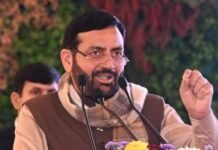A fresh political storm has erupted in India following the recent phone conversation between Prime Minister Narendra Modi and former US President Donald Trump, which was initially touted as a diplomatic achievement by the Indian government. However, the Congress party, led by senior leader Jairam Ramesh, has taken sharp exception to both the timing and substance of the call, calling it a “triple jhatka” — or triple shock — to Indian interests. At the center of this controversy is the parallel visit of Pakistan Army Chief General Asim Munir to the United States, including a reported lunch meeting at the White House with Trump, on the same day that the Modi-Trump call took place.
The Congress has raised serious concerns about whether the Indian Prime Minister confronted the former US President about General Munir’s recent inflammatory statements on Kashmir, remarks that many in India believe incited the deadly terror attack in Pahalgam on April 22. The attack claimed the lives of 26 civilians, and Indian intelligence sources have pointed to Pakistan’s deep state and extremist rhetoric from figures like Munir as having directly fueled the violence. Munir had called Kashmir Pakistan’s “jugular vein,” a statement that triggered outrage across Indian political and strategic circles. Foreign Minister S. Jaishankar had earlier linked such statements to the radicalization that inspired the attackers, describing Munir’s words as driven by “extreme religious outlook.”
The Congress has now questioned whether Prime Minister Modi adequately highlighted these concerns during his conversation with Trump, especially in light of the US leader’s past claims of having “helped settle” the India-Pakistan conflict. Jairam Ramesh, in a pointed critique posted on social media, challenged the narrative being built around the Modi-Trump call, arguing that it reflects a failure of Indian diplomacy rather than a triumph. Ramesh asked whether the PM reminded Trump of the links between General Munir’s words and the Pahalgam attack, especially since the Pakistani general is being hosted in Washington during such a sensitive time.
Adding to the criticism, Ramesh drew attention to what he termed a pattern of diplomatic slights — including repeated assertions by Trump that he had resolved tensions between India and Pakistan and public praise from top American generals who have labeled Islamabad a “phenomenal” partner in counterterror operations. These, the Congress leader claimed, combine to form the “triple jhatka” for India — a series of developments that question the credibility and effectiveness of India’s foreign policy under the current government.
The opposition also demanded that Prime Minister Modi address Parliament and provide a detailed account of his conversation with Trump. The Congress argued that transparency is essential given the broader strategic implications of the Pakistani military leadership being given prominence in Washington, even as India reels from terror attacks it blames on Pakistan’s support for cross-border militancy.
In response, the Bharatiya Janata Party (BJP) has dismissed the Congress’ allegations. Amit Malviya, the party’s IT cell chief, launched a counterattack on Jairam Ramesh, calling him a “congenital liar” and comparing his statements to those of Rahul Gandhi. Malviya rejected the claim that the United States had released any official readout of the Modi-Trump conversation and accused Ramesh of spreading misinformation by selectively quoting Foreign Secretary Vikram Misri’s statement and misrepresenting facts.
The clash underscores a broader political fault line over how India handles its relations with Pakistan and the United States, particularly when terrorism and cross-border militancy are involved. Critics argue that despite India’s global image as a rising diplomatic power, such incidents — where adversarial military leaders are welcomed in allied capitals — expose the limitations of soft power and backchannel influence. Supporters of the government, however, insist that India’s strategic posture remains strong, and the nation is being taken seriously by world powers precisely because of its calibrated, measured responses.
For India, the presence of Pakistan’s military chief in Washington, in tandem with high-level phone diplomacy with the former American President, raises uncomfortable questions. These are not only about optics but about substance — whether New Delhi’s concerns are adequately voiced and, more importantly, whether they are being heard and acted upon. With tensions simmering in the Kashmir Valley and India’s global allies walking their own tightropes of diplomacy, the days ahead may test the depth and durability of India’s foreign relations.
#IndiaUSRelations #ModiTrumpCall #PakistanArmyChief #JairamRamesh #KashmirTensions #PahalgamAttack #DiplomaticRow #CongressVsBJP #GlobalSecurity #ForeignPolicyDebate
This is an auto web-generated news web story.





